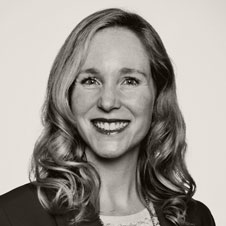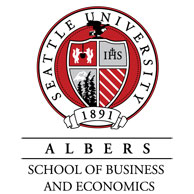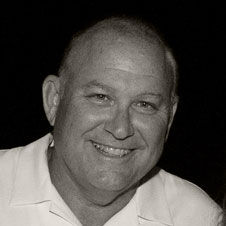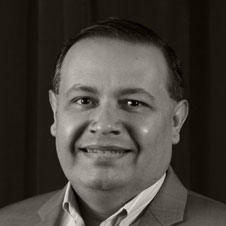
Observe a Class

Observe a Grad Class at Albers
Sitting in on a class can give you a better idea of your prospective program's subject matter, learning and teaching styles, and student-professor interaction.
Albers' graduate classes throughout Fall Quarter 2022 are face-to-face or online. Online classes are either synchronous or asynchronous:
- Synchronous classes happen in real-time, with real-time interaction between students and teacher.
- Asynchronous classes do not occur at the same time. These can take the form of pre-recorded video lessons, digital assignments, discussion boards, and other learning tasks that can be completed by students on their own.
Below are current classes open to prospective students. All require arrangements made in advance. Simply click on the button below your desired class to learn more.
-
Accounting
-
ACCT 5125: Intermediate Accounting III - Tuesdays
Niranjan 'Chips' Chipalkatti, PhD The intermediate financial accounting courses are designed to prepare the student for a career in professional accounting. Â Upon conclusion of the sequence the student should: (1) understand the issues involved in accounting policy choice; (2) understand the process and the conceptual framework according to which accounting standards are set in the United States as well as internationally; (3) have in-depth knowledge of accounting for transaction, events and adjustment affecting assets, liabilities, shareholders' equity, revenues, expenses, gains, and losses.
The intermediate financial accounting courses are designed to prepare the student for a career in professional accounting. Â Upon conclusion of the sequence the student should: (1) understand the issues involved in accounting policy choice; (2) understand the process and the conceptual framework according to which accounting standards are set in the United States as well as internationally; (3) have in-depth knowledge of accounting for transaction, events and adjustment affecting assets, liabilities, shareholders' equity, revenues, expenses, gains, and losses.Over his teaching career, "Chips" Chipalkatti has taught various accounting courses including graduate and undergraduate intermediate accounting, introductory accounting, international accounting, auditing, and accounting information systems. He has presented his research findings at various conferences including those conducted by the American Accounting Association and the Financial Management Association. His articles have been published in various journals including the Journal of Accounting Research, Journal of International Accounting Research, Annals of Public and Cooperative Economics, Journal of Developing Areas, International Journal of Financial Services Management, Oxford Development Studies, The CPA Journal, and the Business Valuation Review.
ACCT 5350: Adv Fed Income Tax II - Wednesdays, Hybrid Class
Katrhryn Troxel, CPA, MST Study of advanced topics in federal taxation, including formation, operation and dissolution of the business entity. Also includes the importance of ethical considerations, and special tax subjects.
Study of advanced topics in federal taxation, including formation, operation and dissolution of the business entity. Also includes the importance of ethical considerations, and special tax subjects.Ms. Troxel has both public accounting and private accounting work experience. She has worked at two of the Big Four accounting firms, KPMG LLP Seattle office and Ernst & Young LLP San Francisco office. She has also worked for a number of years as the solo in-house tax department for several Technology Software Companies (SAS) startups in the Bay Area. She began teaching tax and accounting classes early in her career, initially at San Francisco State, and then the University of San Francisco, as well as UC Davis. Ms. Troxel has a passion for her subject matter as a tax specialist, and enjoys sharing her knowledge with others. She has spoken at the Women in Business Forum, and for the Tax Director Association. Ms. Troxel is the recipient of the 2003 Soroptimist International of the Americas award for service, and was a Washington State Regents Scholar, 2003. She received her Certificate of Public Accounting License in 2008.
Learn more about our Master's in Accounting and Analytics or our Master's in Professional Accounting.
-
Bridge MBA
-
BRMB 5240: Business Analytics & Data Modeling - Mondays 9-11:40 a.m.
Ben Yeo, PhD This course provides students with a foundational understanding of how to turn data into useful information, insight, and intelligence to formulate concrete recommendations and support business decision-making. Focusing on the application of statistical theories and managerial interpretation of results using statistical tools, it provides an overview of the field of business analytics and develops students' skills in descriptive, predictive, and prescriptive analytics. Students will learn how to identify, evaluate, and analyze data using statistical, exploratory, and predictive modeling to capture business opportunities, gain business insights and support managerial decisions.
This course provides students with a foundational understanding of how to turn data into useful information, insight, and intelligence to formulate concrete recommendations and support business decision-making. Focusing on the application of statistical theories and managerial interpretation of results using statistical tools, it provides an overview of the field of business analytics and develops students' skills in descriptive, predictive, and prescriptive analytics. Students will learn how to identify, evaluate, and analyze data using statistical, exploratory, and predictive modeling to capture business opportunities, gain business insights and support managerial decisions.Ben Yeo obtained his PhD in Information Science from the Pennsylvania State University. His research interests include the impact of technology and innovation on industry and regional performance, as well as issues related to IT workers, using primarily statistical and data mining methods. In addition, he has also conducted research investigating corporate social responsibility and mobile advertising.
Learn more about our early career Bridge MBA designed for individuals with a non-business undergraduate degree and limited work experience.
-
Business Analytics
-
BUAN 5240: Managing Stakeholders W/ Data - Wednesdays
Joe Schlegel, MA This course helps you address traditional problems in management and marketing with data and data analysis in ways that could not even be imagined a few years ago. You will think critically about how effective stakeholder management can enable the realization of business value, and understand how poor handling of data and relationships can negatively impact organizational outcomes. This course is required but may be waived with a business undergraduate degree or significant business coursework.
This course helps you address traditional problems in management and marketing with data and data analysis in ways that could not even be imagined a few years ago. You will think critically about how effective stakeholder management can enable the realization of business value, and understand how poor handling of data and relationships can negatively impact organizational outcomes. This course is required but may be waived with a business undergraduate degree or significant business coursework.Joe is a former Sales professional with a 27-year career with Verizon, all within the Sales and Sales Leadership divisions. He has experienced the joys and challenges of corporate life and mergers in the Fortune 50 footprint. After working for a large corporation, he stepped back to help a small business expand its presence in the Construction Management field. He has overseen the growth of this Woman-owned business from less than $1M in revenue to over $14M in less than 7 years, as well as seen CM Solutions go from 5 to 60 people.
BUAN 5315: Big Data Analysis - Tuesdays
James Lee, PhD Big Data is a term applied to data sets whose size is beyond the ability of commonly used software tools to capture, manage, and process within a tolerable elapsed time. Big data tools have been evolved to the application of analytic techniques to very large, diverse data sets that often include varied data types and streaming data, i.e., parallel computing, MapReduce, NoSQL, etc. This class will discuss big data tools, analysis and use cases.
Big Data is a term applied to data sets whose size is beyond the ability of commonly used software tools to capture, manage, and process within a tolerable elapsed time. Big data tools have been evolved to the application of analytic techniques to very large, diverse data sets that often include varied data types and streaming data, i.e., parallel computing, MapReduce, NoSQL, etc. This class will discuss big data tools, analysis and use cases.James Lee is a Genevieve Albers Visiting Professor of Albers School of Business and Economics. Prior to that, he had served as an assistant professor at State University of New York at Binghamton. He teaches primarily in the areas of Business Analytics, Information Systems, Internet and Web Strategies, and IT Management. His current research interests are Business Analytics on Cloud Computing, and Service Oriented Architecture. Dr. Lee's publications have appeared in such journals as the Communications of ACM, Journal of Information Technology, Industrial Management & Data Systems, International Journal of E-Business Research and many more. He is also actively consulting on Businesses on Internet and Web Development.
Learn more about our STEM-designated Master's in Business Analytics.
-
Finance
-
FINC 5320: Advanced Topics in Investments - Mondays
Peter Brous, PhD Examination of advanced current topics and issues in investments using a seminar approach. The course involves readings, discussions, applications, and case studies on selected topics.
Examination of advanced current topics and issues in investments using a seminar approach. The course involves readings, discussions, applications, and case studies on selected topics.Peter Brous earned a PhD in finance from the University of Oregon in 1989. Before joining Seattle University in 1992, he was an assistant professor for four years at Pennsylvania State University. He has published many articles in the top finance and accounting journals, including the Journal of Finance, Journal of Financial Economics, Journal of Financial and Quantitative Analysis, and the Journal of Accounting Research. Additionally, Dr. Brous has published several pedagogical research papers in the Journal of Financial Education.
Learn more about Albers' Master's in Finance, a STEM-designated program that develops your knowledge of corporate finance, investments, and financial institutions and markets.
-
Information Systems
-
IS 5325: Capstone Prjt Busn Analytics - Wednesdays and Fridays (F2F)
Kurt Wedgwood, MBA The Capstone is an application of data analytics in the planning and execution of a one-quarter long real-life development project. Students work in teams to define and carry out an analytics project from initial requirements analysis to final implementation. Primary tasks include an identification of datasets, ETL (Extraction, Transformation, and Loading), building data mining models, and validation. This activity will culminate in a formal presentation of results at the end of the quarter.
The Capstone is an application of data analytics in the planning and execution of a one-quarter long real-life development project. Students work in teams to define and carry out an analytics project from initial requirements analysis to final implementation. Primary tasks include an identification of datasets, ETL (Extraction, Transformation, and Loading), building data mining models, and validation. This activity will culminate in a formal presentation of results at the end of the quarter.Kurt provides an experiential learning environment within and outside the classroom. His academic focus in business is complemented with his work in Process reengineering in Asia, Europe, and the United States. His depth is centered in Retail, Consumer Products, and Travel/Transport/Hospitality. The emergence of Blockchain has allowed him to lead a group of practitioners and shape IBM's go to market with the new capabilities. Blockchain leverages the best of systems and the new order of collaboration, consensus, and coordination between companies. When not working (formerly at Accenture, currently at IBM), Kurt enjoys helping startups and has chaired Seattle U's Innovation and Entrepreneurship Advisory Board.
-
Management
-
MGMT 5300: Family-Owned Business - Wednesdays (Synchronous)
Martin Acevedo, MBA. MSF Explores the management, family, career and personal issues found in family-owned and managed companies. The course develops a student's understanding of these organizations and skills to address the challenges family companies and families in business face. Primary subject areas include: how family business ownership systems evolve; managing of ownership conflict with family relationships; changing family business structures and responsibilities; women's issues in family businesses; managing succession and continuity; designing effective business boards and family governance; and best practices in family business management. The course develops a student's understanding of family organizations and skills necessary to be effective. Upon completion, a student should fully understand many of the complexities associated with operating a family business enterprise.
Explores the management, family, career and personal issues found in family-owned and managed companies. The course develops a student's understanding of these organizations and skills to address the challenges family companies and families in business face. Primary subject areas include: how family business ownership systems evolve; managing of ownership conflict with family relationships; changing family business structures and responsibilities; women's issues in family businesses; managing succession and continuity; designing effective business boards and family governance; and best practices in family business management. The course develops a student's understanding of family organizations and skills necessary to be effective. Upon completion, a student should fully understand many of the complexities associated with operating a family business enterprise. -
MBA
-
MBA 5010: Teams, Leadership and Decision-Making - Tuesdays
William Weis, PhD This course fosters leadership skills and team development through a combination of traditional learning activities (readings, classroom experiences) and an experiential learning laboratory. In experiential activities, participants will be asked to practice various roles necessary to be an effective, high-performing manager and team member.
This course fosters leadership skills and team development through a combination of traditional learning activities (readings, classroom experiences) and an experiential learning laboratory. In experiential activities, participants will be asked to practice various roles necessary to be an effective, high-performing manager and team member.Dr. William Weis is Professor of Management in the Albers School of Business and Economics at Seattle University. His teaching currently focuses on leadership, team development and emotional intelligence. He served as Director of the MBA program from 1995 to 2009.
Learn more about our customizable, flexible, part-time MBA. Designed with the working professional in mind, you can earn your MBA in as little as 2.5 years or 1.5 if done full-time.
-
SEM MBA
-
SBLR 5122: Women and Sport Leadership - Wednesdays
Maylon Hanold, EdD The aim of this course is to provide both women and men insights regarding women and leadership within and beyond the sport context. Students will gain an in-depth understanding of how gender affects leadership and what specific issues women face with respect to leadership.
The aim of this course is to provide both women and men insights regarding women and leadership within and beyond the sport context. Students will gain an in-depth understanding of how gender affects leadership and what specific issues women face with respect to leadership.Maylon Hanold is Director of the Master in Sport Business Leadership program at Seattle University. She has taught courses in research methods for sport, sport sociology, sport leadership, women and sport leadership, human resources, sport events, and organizational effectiveness. Her research interests lie at the intersections of sport sociology, gender, and leadership. She has written about lived experiences in sport including ultrarunning, long distance running, and transgender recreational sport experiences. In addition, her leadership research focuses on the physicality of leadership as related to embodied biases, empathy as a leadership skill, authentic leadership, and leadership development.